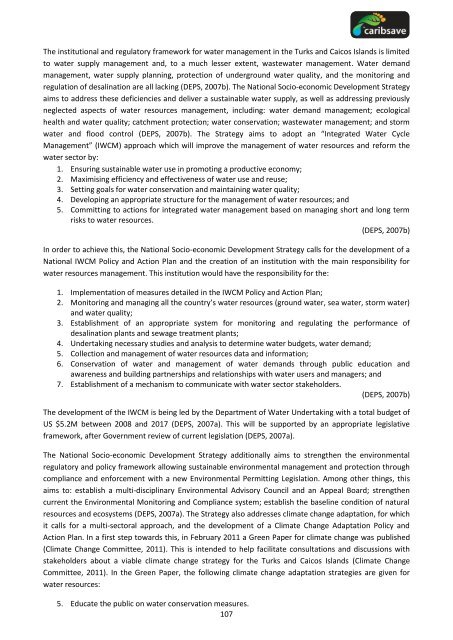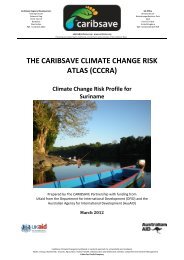You also want an ePaper? Increase the reach of your titles
YUMPU automatically turns print PDFs into web optimized ePapers that Google loves.
The institutional <strong>and</strong> regulatory framework for water management in the <strong>Turks</strong> <strong>and</strong> <strong>Caicos</strong> Isl<strong>and</strong>s is limited<br />
to water supply management <strong>and</strong>, to a much lesser extent, wastewater management. Water dem<strong>and</strong><br />
management, water supply planning, protection of underground water quality, <strong>and</strong> the monitoring <strong>and</strong><br />
regulation of desalination are all lacking (DEPS, 2007b). The National Socio-economic Development Strategy<br />
aims to address these deficiencies <strong>and</strong> deliver a sustainable water supply, as well as addressing previously<br />
neglected aspects of water resources management, including: water dem<strong>and</strong> management; ecological<br />
health <strong>and</strong> water quality; catchment protection; water conservation; wastewater management; <strong>and</strong> storm<br />
water <strong>and</strong> flood control (DEPS, 2007b). The Strategy aims to adopt an “Integrated Water Cycle<br />
Management” (IWCM) approach which will improve the management of water resources <strong>and</strong> reform the<br />
water sector by:<br />
1. Ensuring sustainable water use in promoting a productive economy;<br />
2. Maximising efficiency <strong>and</strong> effectiveness of water use <strong>and</strong> reuse;<br />
3. Setting goals for water conservation <strong>and</strong> maintaining water quality;<br />
4. Developing an appropriate structure for the management of water resources; <strong>and</strong><br />
5. Committing to actions for integrated water management based on managing short <strong>and</strong> long term<br />
risks to water resources.<br />
(DEPS, 2007b)<br />
In order to achieve this, the National Socio-economic Development Strategy calls for the development of a<br />
National IWCM Policy <strong>and</strong> Action Plan <strong>and</strong> the creation of an institution with the main responsibility for<br />
water resources management. This institution would have the responsibility for the:<br />
1. Implementation of measures detailed in the IWCM Policy <strong>and</strong> Action Plan;<br />
2. Monitoring <strong>and</strong> managing all the country’s water resources (ground water, sea water, storm water)<br />
<strong>and</strong> water quality;<br />
3. Establishment of an appropriate system for monitoring <strong>and</strong> regulating the performance of<br />
desalination plants <strong>and</strong> sewage treatment plants;<br />
4. Undertaking necessary studies <strong>and</strong> analysis to determine water budgets, water dem<strong>and</strong>;<br />
5. Collection <strong>and</strong> management of water resources data <strong>and</strong> information;<br />
6. Conservation of water <strong>and</strong> management of water dem<strong>and</strong>s through public education <strong>and</strong><br />
awareness <strong>and</strong> building partnerships <strong>and</strong> relationships with water users <strong>and</strong> managers; <strong>and</strong><br />
7. Establishment of a mechanism to communicate with water sector stakeholders.<br />
(DEPS, 2007b)<br />
The development of the IWCM is being led by the Department of Water Undertaking with a total budget of<br />
US $5.2M between 2008 <strong>and</strong> 2017 (DEPS, 2007a). This will be supported by an appropriate legislative<br />
framework, after Government review of current legislation (DEPS, 2007a).<br />
The National Socio-economic Development Strategy additionally aims to strengthen the environmental<br />
regulatory <strong>and</strong> policy framework allowing sustainable environmental management <strong>and</strong> protection through<br />
compliance <strong>and</strong> enforcement with a new Environmental Permitting Legislation. Among other things, this<br />
aims to: establish a multi-disciplinary Environmental Advisory Council <strong>and</strong> an Appeal Board; strengthen<br />
current the Environmental Monitoring <strong>and</strong> Compliance system; establish the baseline condition of natural<br />
resources <strong>and</strong> ecosystems (DEPS, 2007a). The Strategy also addresses climate change adaptation, for which<br />
it calls for a multi-sectoral approach, <strong>and</strong> the development of a Climate Change Adaptation Policy <strong>and</strong><br />
Action Plan. In a first step towards this, in February 2011 a Green Paper for climate change was published<br />
(Climate Change Committee, 2011). This is intended to help facilitate consultations <strong>and</strong> discussions with<br />
stakeholders about a viable climate change strategy for the <strong>Turks</strong> <strong>and</strong> <strong>Caicos</strong> Isl<strong>and</strong>s (Climate Change<br />
Committee, 2011). In the Green Paper, the following climate change adaptation strategies are given for<br />
water resources:<br />
5. Educate the public on water conservation measures.<br />
107





